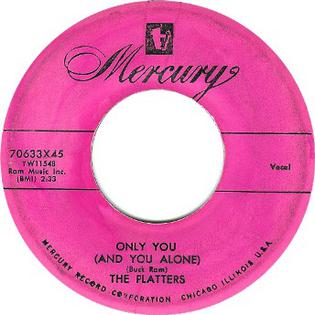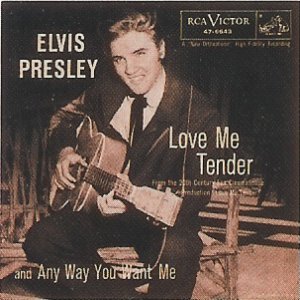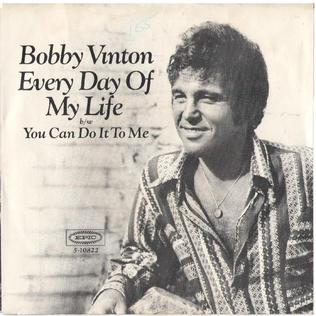Related Research Articles
The Billboard Hot 100 is the music industry standard record chart in the United States for songs, published weekly by Billboard magazine. Chart rankings are based on sales, online streaming, and radio airplay in the U.S.

"Only You (And You Alone)" (often shortened to "Only You") is a doo wop song composed by Buck Ram, the manager of the Platters, the group that made the song famous in the US, the UK and Belgium. The Platters's lead vocals are by Tony Williams.

"The Great Pretender" is a popular song recorded by the Platters, with Tony Williams on lead vocals, and released as a single in November 1955. The words and music were written by Buck Ram, the Platters' manager and producer who was a successful songwriter before moving into producing and management. The song reached No. 1 on Billboard's Top 100, and No. 5 on the UK charts.

"He" is a song about God, written in 1954. The song made the popular music charts the following year.

"The Wayward Wind" is a country song written by Stanley Lebowsky (music) and Herb Newman (lyrics), and first recorded by American singer Gogi Grant in 1955, and released in 1956. Grant's version reached No. 1 on both the Cash Box charts, where it remained at No. 1 for five weeks, and the Billboard charts, remaining at No. 1 for six weeks, ending Elvis Presley's seven-week run at No. 1 with "Heartbreak Hotel". It remained in the top 10 for fifteen weeks, and was ranked as the No. 5 song for 1956 according to Billboard. It became a Gold record. Members of the Western Writers of America chose the song as one of the Top 100 Western songs of all time.
Dance Club Songs was a chart published weekly between 1976 and 2020 by Billboard magazine. It used club disc jockeys set lists to determine the most popular songs being played in nightclubs across the United States.

"Love Me Tender" is a 1956 ballad song recorded by Elvis Presley and published by "Elvis Presley Music" from the 20th Century Fox film of the same name. Lyrics are credited to "Vera Matson". The melody is identical to the sentimental Civil War ballad "Aura Lea" and therefore credited to Aura Lea's composer, the Englishman George R. Poulton. The RCA Victor recording by Elvis Presley was No. 1 on both the Billboard and Cashbox charts in 1956.
"It's Almost Tomorrow" is a 1955 popular song with music by Gene Adkinson and lyrics by Wade Buff. The song was actually written in 1953, when Adkinson and Buff were in high school. Hit versions were released in 1955 by The Dream Weavers, Jo Stafford, David Carroll, and Snooky Lanson.
"Memories Are Made of This" is a popular song about nostalgia, written in 1955 by Terry Gilkyson, Richard Dehr, and Frank Miller. They were the members of a three-pieced group called "The Easy Riders", who served as a backing band for Dean Martin's version of this song, also released in 1955.

"Why Do Fools Fall in Love" is a debut single by American rock and roll band Frankie Lymon & the Teenagers that was released on January 10, 1956. It reached No. 1 on the R&B chart, No. 6 on Billboard's Pop Singles chart, and No. 1 on the UK Singles Chart in July. Many renditions of the song by other artists have also been hit records in the U.S., including versions by the Diamonds, the Beach Boys, and Diana Ross.
"Young Love" is a popular song, written by Ric Cartey and Carole Joyner, and published in 1956. The original version was recorded by Ric Cartey with the Jiva-Tones on November 24, 1956. Joyner was a high school student when she co-wrote the song with Cartey, her boyfriend at the time. It was released in 1956 by Stars Records as catalog number 539 and one month later by RCA Records as catalog number 47-6751. Cartey's version never charted.

"The Twelfth of Never" is a popular song written in 1956 and first recorded by Johnny Mathis the following year. The title is a popular expression, which is used as the date of a future occurrence that will never come to pass. In the case of the song, "the 12th of Never" is given as the date on which the singer will stop loving his beloved, thus indicating that he will always love them.

"I Forgot to Remember to Forget" is a 1955 country and rockabilly song, first recorded by Elvis Presley and written by Stan Kesler and Charlie Feathers. It was Elvis' first no. 1 record nationally. The single was the fifth and final single released on Sun Records before Elvis moved to RCA Records.

"Eddie My Love" is a 1956 doo wop song. According to BMI and ASCAP, the song was written by Maxwell Davis (BMI), Aaron Collins, Jr. (ASCAP), and Sam Ling (BMI). Maxwell Davis played sax on the Teen Queens record. Aaron Collins was the brother of the Teen Queens. Sam Ling was an alias of Saul Bihari, co-founder of Modern, RPM, and other labels; Bihari and his brothers regularly attached their names to songwriting credits as a means of getting a cut of the royalties, as was common practice at the time.
"The Garden of Eden" is a song written and composed by Dennise Haas Norwood, and first recorded by Joe Valino, which reached Number 12 on the Billboard chart in December 1956. The song was also recorded by other artists, including Frankie Vaughan whose version gave him his first No. 1 in the UK in 1957.
"Standing on the Corner" is a popular song written by Frank Loesser and published in 1956. It was introduced by Shorty Long, Alan Gilbert, John Henson, and Roy Lazarus in the Broadway musical, The Most Happy Fella.

"Ev'ry Day of My Life" is a popular song written in 1954 by Al Jacobs and Jimmie Crane.

The singles discography of Elvis Presley began in 1954 with the release of his first commercial single, "That's All Right". Following his regional success with Sun Records, Presley was signed to RCA Victor on November 20, 1955. Presley's first single with RCA, "Heartbreak Hotel", was a worldwide hit, reaching the No. 1 position in four countries and the top 10 in many other countries. Other hit singles from the 1950s include "I Want You, I Need You, I Love You", "Don't Be Cruel", "Hound Dog", "Love Me Tender", "Too Much", "All Shook Up", "(Let Me Be Your) Teddy Bear", "Jailhouse Rock", "Don't", "Wear My Ring Around Your Neck", "Hard Headed Woman", "One Night", "(Now & Then There's) A Fool Such as I", and "A Big Hunk o' Love". On March 24, 1958, Presley entered the United States Army at Memphis, Tennessee, and was stationed in Germany. He left active duty on March 5, 1960.
References
- ↑ Whitburn, Joel (2000-11-01). The Billboard Book of Top 40 Hits (7th Rev. ed.). New York: Watson-Guptill Publications. ISBN 978-0-8230-7690-1.